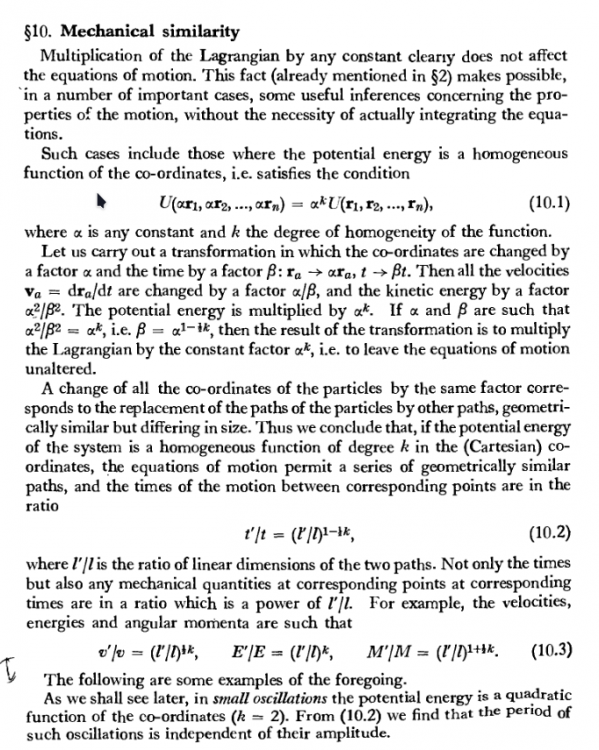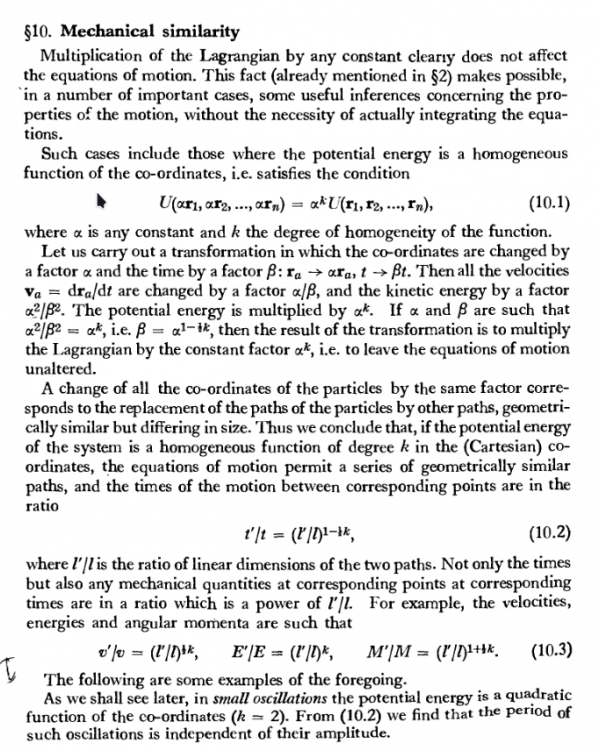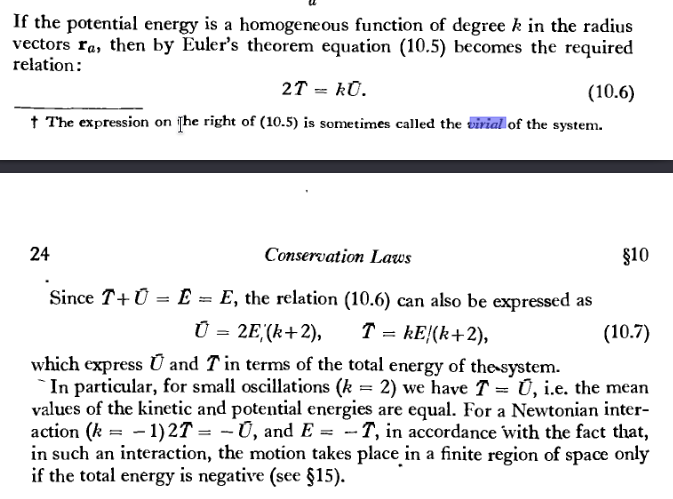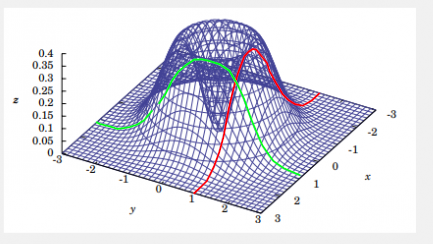-
Posts
4811 -
Joined
-
Days Won
56
Content Type
Profiles
Forums
Events
Everything posted by joigus
-
I would follow @studiot's advice here to disentangle physics and mathematics. There is a relationship to be sure, but there are many dangers in thinking one is the other. As to the virial theorem, in case you're interested, I'm going to follow Studiot's example too and give you a piece of a very commendable book. Landau-Lifshitz, Course of Theoretical Physics, Vol. 1. Mechanics:
-
Yeah, I think there's something at the root of art that's to do with the unattainable, with longing. I think when art was jump-started, back in the paleolithic, the main motivation must have been to conjure up those things that mattered most to our ancestors, but were not there and they could hardly wait to see again --mostly pack animals that constituted their main resource for survival, when they were gone and they knew they would have to wait for another year for them to come back. Curiously enough, they didn't depict predators nearly as much as they did their favourite prey. Then it became more about gods and human authorities. 'Think of me when I'm not here.' Sure that was what Roman emperors had in mind when they had artistic renditions of themselves put in place hundreds and hundreds of miles away from the place from where they exerted their authority. It's when photography became possible that art started to become more abstract, and more of an interior journey. Thanks for the link, BTW. I'm not surprised that, when people can be taken at their word that they like the art the see or hear, a rush of neurotransmitters goes with it.
-
You can do worse than being called a philosophical minimalist. The truth is I share your sentiments. Philosophy --the axiomatic approach-- has made my head spin in the past. I prefer hard-scientific, fact-based approaches. To a question such as 'what is art?', I think anthropology, paleoanthropology, and the like; have a lot to say about it. Also neuroscience. We cannot possibly understand what it is without understanding what paleolithic art was, as well as what it is that art does to our brains. What were those people trying to tell each other, themselves, or us? What does art do to our brains?
-
By the artist(s), of course. You are a philosophical minimalist, @Genady.
-
I'm not sure what relevance this has on Cantor's hypothesis, but the virial theorem is actually more general: True for any potential that is homogeneous in the spatial coordinates: \[ V\left(\lambda\boldsymbol{x}\right)=\lambda^{n}V\left(\boldsymbol{x}\right) \] So ideal gases, harmonic oscillators, and inverse-square systems all have a version of it. Sorry. I mistook this thread for another one. Oops!
-
How about this?: It's any original human-made thing that is intended, not necessarily to serve a practical function, but to engage an audience is sensory, emotional and imaginative dialogue with the artist, and thereby alter their view of the world.
-

Does modern physics support solipsism?
joigus replied to arnold3000's topic in Modern and Theoretical Physics
Not that I want to redirect the thread according to my wishes; and despite some very interesting comments having popped up so far, may I insist on my question? Why would it? That is: What is the salient argument from 'modern physics' that would support the view that solipsism is tenable/necessary/etc. in our view of the world? I don't see it. I do intuit that it's to do with quantum mechanics. Namely: that only the mind exists --Wigner's friend and so on. How does physics support that view --or any variant of it that can be explained clearly? Mind you, interpretations of quantum mechanics based on conscience are something of the past, and most of the physics community today find these interpretations at the very least unnecessary, and --given that, and that all consequences of quantum mechanics can be experimentally confirmed and objectively agreed--, unpalatable. Conscience should eventually be explained by science, but not taken as the underpinnings of it. Thinking, or even suggesting that, eg., craters on Mercury that were formed, say, 2 billion years ago, can be explained from the dynamics of the mind, is absolutely ridiculous. But if this complete turning upside-down of the mechanisms of explanation were to be inevitable, very strong arguments, and a theory accompanying them, should be provided. Vague suggestions coming from fancy phrasings of the peculiar aspects of quantum mechanics are not good enough. So I suppose I agree with the OP. I do not believe it. -

Does modern physics support solipsism?
joigus replied to arnold3000's topic in Modern and Theoretical Physics
Why would it? -

If I was able to live for millions of years
joigus replied to Snowbeaver's topic in Evolution, Morphology and Exobiology
Just to add "cautionary tales of evolution" to what @Phi for All said, The male praying mantis is, in terms of evolution, very successful. Yet, he does it by providing the female with a delicious romantic dinner after sex in which he is the main and only course. Think about the implications of this. Evolution only cares about reproductive success. Doing well for yourself doesn't necessarily matter so much. Fig wasps are an even more extreme example. There are more examples of reproductive champion = individual loser in Nature. In tournament species, successful males are tipically short-lived. -
Thanks, Eise. I think the Dutch --both the language and the people-- are special in many ways, and in a very good way. But ambiguity is certainly no privilege of the Dutch. It's --arguably-- ubiquitous with human communication. It's sure enough present in the animal kingdom too.
-
Yes. My rendering: They saw the girl who was carrying carries the binoculars They, with the help of some binoculars, saw the girl They spotted the girl, who was carrying some binoculars They spotted the girl with the help of some binoculars Nice example! First and second: 'saw" = use a saw to cut something Is the ambiguity also in 'zagen' and 'met'?
-
Combinations of negative with composite sentences are my favourites. With imperative: 1) Don't just sit there and introduce yourself! 2) Don't just sit around and eat! (Solved with a comma in writing, and with voice modulation when speaking.) With 'because': I didn't marry him because of the money. Nice topic, BTW. I found 4 possible meanings. Some of them are gruesome. One, bordering plain absurd. But nice example!
-
Hi. I'm not an expert, but I can tell you what the present status of Cantor's continuum hypothesis is: (My emphasis.) https://en.wikipedia.org/wiki/Continuum_hypothesis So, within the Zermelo-Frenkel set-theory axioms, plus the axiom of choice, you can neither prove nor disprove the continuum hypothesis. And that's what I know. The possibility of a cardinality sandwiched between aleph_0 and aleph_1 is still conjectural.
-
What's eternal, is, even if it lasts for a minute.
-
Awesome.
-
I stand corrected. It sure looks a lot like the Henderson-Hasselbach equation. The base-10 logs should've given me a clue.
-
Tell you what. Why not taking it further still? Zoroaster didn't die, so he was immortal. He became Jesus, who became Mohammed. That works better, I think. Covers more history, and explains monotheism as a logical continuity. IOW, The funny thing about religious thinking is you can make up just about anything. It all seems to work in your mind, under the utterly permissive protocol of coming up with a convenient just-so story, which is what characterises religions of any kind.
-
I know the answer to the 1st one: It's the linearised Arrhenius equation: https://en.wikipedia.org/wiki/Arrhenius_plot which relates pH, pka, and activation energy with absolute temperature. I hope that helps.
-
In the theorem's case, it's important to realise that, \[D=\frac{\partial^{2}f}{\partial x^{2}}\frac{\partial^{2}f}{\partial y^{2}}-\left(\frac{\partial^{2}f}{\partial x\partial y}\right)^{2}=\left|\begin{array}{cc} \frac{\partial^{2}f}{\partial x^{2}} & \frac{\partial^{2}f}{\partial x\partial y}\\ \frac{\partial^{2}f}{\partial y\partial x} & \frac{\partial^{2}f}{\partial y^{2}} \end{array}\right| \] In the case you propose, \[ \left|\begin{array}{ccc} \frac{\partial^{2}f}{\partial x^{2}} & \frac{\partial^{2}f}{\partial x\partial y} & \frac{\partial^{2}f}{\partial x\partial z}\\ \frac{\partial^{2}f}{\partial y\partial x} & \frac{\partial^{2}f}{\partial y^{2}} & \frac{\partial^{2}f}{\partial y\partial z}\\ \frac{\partial^{2}f}{\partial z\partial x} & \frac{\partial^{2}f}{\partial z\partial y} & \frac{\partial^{2}f}{\partial z^{2}} \end{array}\right| \] The condition that these 2nd-order determinants not being zero amount to being able to invert the relation that gives you the second-order derivatives and ascertaining the nature of your critical point. The determinant being zero amounts to second-order equations not being solvable, and therefore the method being inconclusive. There's an elegant method to solve this kind of problem which is the method of Lagrange multipliers. And there's the method that @Genady proposes too.
-

Maxima and Minima (vector calculus)
joigus replied to Dhamnekar Win,odd's topic in Analysis and Calculus
Sorry. I meant the next-to-zeroth-order correction. If you Taylor-series expand you immediately see it's a maximum, because there0s no 1st-order correction and the 2nd-order correction is negative. That's what I mean, and sorry for the confusion. -

Maxima and Minima (vector calculus)
joigus replied to Dhamnekar Win,odd's topic in Analysis and Calculus
https://www.wolframalpha.com/input?i=plot+(x^2%2By^2)exp((-x^2-y^2)) The intuitive idea you can get from highlighting x=1 and y=1 curves: And another analytic tool is using polar coordinates, \[ \left(x^{2}+y^{2}\right)\exp\left(-x^{2}-y^{2}\right)=r^{2}\exp\left(-r^{2}\right) \] and then do a Taylor-series expansion around r=1 in a small positive parameter \( \varepsilon \), \[ r=1+\varepsilon \] \[ \varepsilon>0 \] \[ r^{2}\exp\left(-r^{2}\right)=\left(1+\varepsilon\right)^{2}\exp\left(-\left(1+\varepsilon\right)^{2}\right)=\left(1+2\varepsilon+\varepsilon^{2}\right)\exp\left(-1-2\varepsilon-\varepsilon^{2}\right)= \] \[ =e^{-1}\left(1+2\varepsilon+\varepsilon^{2}\right)\exp\left(-2\varepsilon-\varepsilon^{2}\right)= \] \[ =e^{-1}\left(1+2\varepsilon+\textrm{order}\left(\varepsilon^{2}\right)\right)\left(1-2\varepsilon+\textrm{order}\left(\varepsilon^{2}\right)\right)= \] \[ =e^{-1}\left(1-4\varepsilon^{2}\right)+\textrm{order}\left(\varepsilon^{2}\right) \] And, as you see, the first-order correction is negative no matter what orientation with respect to the origin (just where the bump is) you place yourself. Same goes for 1-epsilon, of course. -
Great topic that deserves more attention, though I'm glad it got the one it did. I don't know if my comment will be useful, but I'm thinking of chess as an interesting testing ground. Computers have far exceeded the capabilities of human minds. Computers play only on the grounds of pure combinatorics. Grand Masters, on the contrary, although they have powerful combinatoric minds by human standards, at some point through the complexity of the game, they must base a significant part of their reasoning on strategic, conceptual principles rather than pure if-then sequences. Strategic principles can deal with wide classes of combinatoric landscapes with the result of improving your chances of winning only on the average. It is not entirely impossible that computers get so good at calculating outcomes that the make our pattern-based reasoning obsolete. It is entirely possible that if we insist on computers being conceptual, we'll force them to play on somebody else's turf. On the game vs task discussion; I see no difference at all. But maybe I haven't thought about it hard enough.
-

perpetual motion machine (split from topic of the same name)
joigus replied to JamesL's topic in Speculations
We can only hope. -

perpetual motion machine (split from topic of the same name)
joigus replied to JamesL's topic in Speculations
JamesL's trajectory on SFN is the closest to a perpetual motion I've seen here. Two cycles and counting... Plus perfect experiment on shooting yourself in the foot. -

perpetual motion machine (split from topic of the same name)
joigus replied to JamesL's topic in Speculations
Did you say 'ta-ra'? Sorry, that was a cheap joke. Thank you for providing evidence that it doesn't work --as exchemist has explained. I would also demand of any claim that any of the thermodynamic principles fails, a complete thermodynamic explanation, as well as a thorough examination from mechanics, or field mechanics, or quantum mechanics if need be; of why that thermodynamic principle fails, or an exception is met in that particular case.





